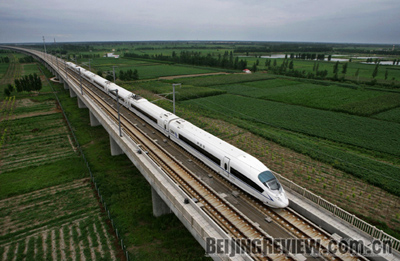| 
SPEEDY CONNECTION The Beijing-Tianjin Intercity Express Railway, the first intercity train on the mainland to reach 300 km per hour, becomes fully operational on August 1. By YUAN RUILUN
Paving Way for New Law
The first regulation that sets specific guidelines for the Anti-Monopoly Law was announced by the State Council on August 4 in a move to provide direction for the enforcement of the law, which came into effect on August 1.
According to the regulation, all integrations among companies must apply to the country's anti-monopoly authorities if the joint global revenue of the companies exceeds 10 billion yuan ($1.5 billion) or if their revenue in China exceeds 2 billion yuan ($292.6 million).
Integrations include mergers and acquisitions, share or asset sales that give one company control of another, and deals in which one company gains control of or is able to impose decisive influence over another firm through signing contracts or other means.
ICBC Gains U.S. Foothold
The Industrial and Commercial Bank of China (ICBC), the world's largest bank by market capitalization, received official approval from the U.S. Federal Reserve Board on August 5 to establish a branch in New York.
This marks a landmark stride in ICBC's global expansion plans, said Wu Bin, Chief Representative of the ICBC New York Representative Office, in a printed statement.
In accordance with Federal Reserve Board orders, ICBC's New York branch will engage primarily in wholesale commercial banking.
After the branch is established, it will become ICBC's business platform in the United States and promote trade exchanges between the two countries.
Sinopec Goes Russian
China Petroleum and Chemical Corp. (Sinopec), China's largest oil refiner, has made a bid for Russian energy giant Imperial Energy Corp. as part of its overseas development strategy.
Imperial Energy's board has allowed Sinopec to start due diligence, according to a report in the British newspaper Sunday Telegraph.
If Sinopec succeeds, it would be the biggest takeover by a Chinese company of a rival listed on the London market, the report said.
Analysts said the move indicates that China, as one of the world's biggest energy consumers, wants to increase its access to Russia's energy market.
Imperial Energy produced about 10,000 barrels of oil per day in December 2007 and is expected to raise its production to 80,000 barrels per day by the end of 2011.
Supervising Exchange Rates
The People's Bank of China, the central bank, will create a new department to manage exchange rate reform and monitor short-term, cross-border capital flows, the China Securities Journal reported on August 1.
The central bank needed to increase its research and management of the supervision of exchange rate policy because of its increasingly significant role in China's economy, said Guo Tianyong, a professor at Beijing's Central University of Finance and Economics, in the report.
The massive short-term money flows, known as "hot money," are believed to be entering China in huge quantities and exacerbating the country's inflationary pressure.
Big Order From Brazil
Brazilian mining giant Companhia Vale do Rio Doce signed a $1.6-billion deal with China's Rongsheng Shipbuilding and Heavy Industries Group Co. Ltd. to build 12 large ore carriers, Vale announced on August 4.
The new ships will have high safety standards and reduce the high costs of transporting iron ore to steelmakers. The fleet will have an estimated carrying capacity of 30.2 million metric tons of iron ore per year, which represents 31 percent of Vale's shipments to China in 2007.
The first of the carriers is slated for completion in early 2010. All 12 carriers should be ready by 2012. The fleet will be part of Vale's Brazil-Asia shuttle service, which currently has six large ore carriers. | 